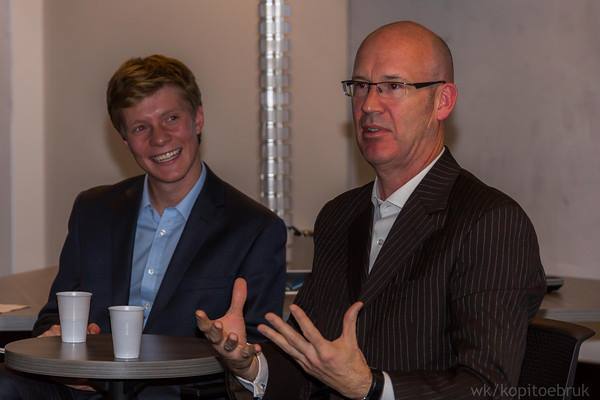Event wrap: Basa-basi with Tim Lindsey
“Imagine a situation where Indonesia had a larger economy than Japan or Germany”. Professor Tim Lindsey, the director of Melbourne University’s Centre for Islamic law, put this prediction to the audience at AIYA’s Basa-basi on May 30th.

Professor Tim Lindsey speaks with AIYA’s Heath Jamieson. (Photo: Windu Kuntoro, Kopitoebruk)
The rise of Indonesia, both in economic and political influence over the past decade, and predictions for its growth were one of the focal points of the evening. Indonesia is currently undergoing a huge transformation that will completely alter the region. Professor Lindsey explained that successive Australian governments have done little or nothing to respond to this rise. “We are not adjusting as a nation”, he said. Perhaps Australia doesn’t take Indonesia seriously enough? Or Australia simply does not understand Indonesia? Whatever the answer, now is the time that Australia needs to reconfigure its attitude about Indonesia.
One way Professor Lindsey suggests to do this is through education. Education is the key to deepening the mutual understanding between the two countries. Unfortunately, despite successive governments pledging to invest in Indonesian Studies, the Indonesian departments at universities are suffering significantly, impacting on the number of Indonesian aware and literate graduates in Australia. Politicians’ public rhetoric is never quite matched by adequate investment. There is also a lack of education about Australia and Australian culture in Indonesia.
Professor Lindsey also stressed the importance of a close relationship with Indonesia for strategic purposes. He warned of the likelihood of a military conflict in the future between China and the United States, as China continues to rise and become more aggressive towards its neighbours, including Japan. When this happens, Indonesia has a strategic advantage due to its naval sea lanes. Australia will need to be secure in its regional relationships to ensure its safety.
So what can AIYA friends and members do to contribute and promote the Australia and Indonesia relationship? Keep doing what we are doing. Professor Lindsey declared he is AIYA’s number 1 fan, and that AIYA is an investment in the future of the relationship. While government-to-government relations may experience difficulties, people-to-people links remain strong. Those who have lived and worked in Indonesia continue to have close ties with friends, families and colleagues who live there. This is despite the vast misunderstanding most Australians and Indonesians have of each other.
He also urged to audience not to ‘museumise’ Indonesia. Our idea of Indonesian culture is based on traditional arts such as batik and wayang. Professor Lindsey urges all Australians to embrace more contemporary forms of Indonesian art. Art is an expression of culture and the thoughts and beliefs of an individual or nation. In order to understand Indonesian as a modern entity, and not underestimate it as a passive, backwards nation, Australians should try to engage with the vibrant, modern art forms. He suggests attending the Indonesian Film Festival for great presentations of modern Indonesian film, and cites the Yogyakarta art scene as a an example of Indonesian art that is making waves across the world.
AIYA’s next Basa-Basi is scheduled for July 30th, when we will have a chat with business guru Debnath Guharoy, who is the current chair of the Australia Indonesia Business Council, and a delegate of CAUSINDY 2013.

